Doctor helps people breathe easier at high elevations


When he noticed that altitude sickness was also common among border soldiers and other migrants who came to take part in the region's economic development, he decided to look for a solution.
"To develop the region, you first had to solve the problem of adaptation to the high altitude," he said.
For decades, Wu spent his time observing and surveying the local population. His hard work paid off.
During construction of the Qinghai-Tibet Railway, the world's highest railway, in the early 2000s, Wu and his team devised a protection-and-first-aid protocol that allowed all 140,000 workers to avoid suffering the effects of acute altitude sickness.
Liu Fengyun, deputy director of the central laboratory of the Qinghai Province Cardiovascular and Cerebrovascular Disease Specialist Hospital, said no casualty during the construction was a "miracle".
- Vibrant China during holiday: Traditional culture meets tech
- China activates emergency response as Typhoon Matmo approaches
- Over 230 anticancer drugs feature in national medical insurance catalog
- South China provinces activate Level-IV emergency typhoon response
- Xi congratulates Luxembourg's Grand Duke Guillaume on enthronement
- Prison terms issued over deadly 2023 Shanxi coal company fire




































